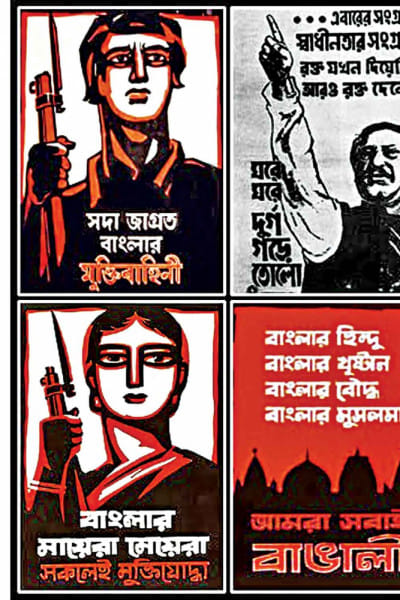1971: A story again made fresh

"When the sun sinks in the west, die a million people of the Bangladesh" - Joan Baez, Song of Bangladesh (1971)
The two World Wars weakened European colonial powers and the Ottoman Empire. India's independence from Britain was inevitable. What narrative would lead to independence was to be seen. The narrative came from the "two-nation theory": a separate land for Hindus and Muslims.
Cyril Radcliffe "partitioned" India along such religious lines. However, he strategically divided only two provinces of British India that were part of a delta civilisation: Punjab in the west (the Sindh delta), and Bengal in the east (the Brahmaputra-Ganges delta). The rest of British India was left undivided.
Thus at midnight, first Pakistan, and then today's India was born.
"Oh, East is East, and West is West, and never the twain shall meet" - Rudyard Kipling, The Ballad of East and West (1889)
The carving out of Pakistan wasn't viable. The west wing had four provinces: Punjab, Sindh, Balochistan, North West Frontier Province; and an independently administered Azad Kashmir. The east wing was East Bengal till 1956, and then renamed East Pakistan. In the middle there was a thousand miles of India. From its birth, the east and the west were destined not to meet.
In March 1948, Muhammad Ali Jinnah declared at today's Suhrawardy Udyan that "Urdu, and only Urdu" will be the state language of Pakistan. Surprisingly, Urdu wasn't the native language of any province of Pakistan. The Bengalis were hurt. The first spark came on February 21, 1952, when blood was spilled demanding recognition of Bangla as the state language of a majority.
As time wore on, Bengalis were neglected more and more. Their cause was being pushed towards an independence movement.
"The more things change, the more they stay the same." - Jean-Baptiste Alphonse Karr, Les Guêpes (July 1848)
In 1948, there were 11 textile factories in the east, and 6 in the west. In 1971, the east had 26 and the west 150 textile factories. Between 1948 and 1960, the east earned 70% of total exports, yet enjoyed only 25% imports. An estimated US$ 2.6 billion (in 1971 exchange rates) was transferred from the east to the west.
The eastern wing of Pakistan effectively became a colony of the west. Bangabandhu Sheikh Mujibur Rahman's six point movement in 1966 addressed the economic and political exploitation of the west towards the east. No amicable solution was found. The beginning of the end was looming.

"The end is where we start from." - T.S. Eliot, Little Gidding (1942)
November 11, 1970. A cyclone hit Bhola in the southern part of the country. It was one of the most devastating cyclones in history. It took the lives of at least 300,000 people according to conservative estimates. The east was left to fend for itself. Help from the centre in the west was either slow to come or the west wasn't interested in helping. Either way, the Bengalis were once again offended.
December 7, 1970. Pakistan held its first parliament elections. There were 300 seats. 162 seats were in East Pakistan; 138 in West Pakistan. The two main parties were the Awami League led by Bangabandhu Sheikh Mujibur Rahman; and the Pakistan Peoples' Party (PPP) led by Zulfikar Ali Bhutto. The Awami League won 160 seats -- more than half, and the majority. The PPP won 81 seats. Again, dark clouds were looming.
Yahya Khan and Zulfikar Ali Bhutto didn't want the Awami League to form the government. They were biding time by holding talks. Meanwhile, the Pakistan military in East Pakistan was being armed for a possible onslaught on the Bengalis. This created unrest. On March 7, 1971, Bangabandhu Sheikh Mujibur Rahman, in his finest hour, told the world the inevitable.
On the night of March 25, 1971, Operation Searchlight started. And with it a systematic genocide. The wheels of history were set in motion. The cause was just. Bangladesh was set to script the world's first liberation war that started with establishing language as the just cause for liberation.
"The story of Bangladesh is an ancient one, again made fresh" - Joan Baez, Song of Bangladesh (1971)
An independence war is always a war of just against unjust. Very few nations have had the privilege of fighting a liberation war. Bangladesh is one of those lucky nations. Bangladesh paid a huge price. In 266 days, 3 million lives were sacrificed. That is more than seven lives every minute. Ten million became refugees, and were dislocated in neighbouring India. Unknown and countless women were raped. This was just the human price of freedom.
And yet, Bangladesh didn't give up its pride. A nation and nationhood thrives on pride. The generation of 1971 instilled that pride for the generation of 2021 to lead Bangladesh forward in the 21st century.
Asrar Chowdhury teaches Economics in classrooms. Outside, he watches Test cricket, plays the flute and listens to music and radio podcasts. Email: [email protected] or [email protected]

 For all latest news, follow The Daily Star's Google News channel.
For all latest news, follow The Daily Star's Google News channel. 



Comments